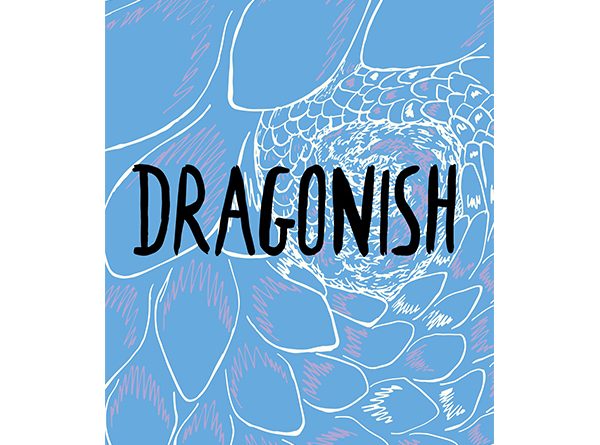Dragonish by Emma Simon
–Reviewed by Pam Thompson–
The title of Emma Simon’s collection is a word borrowed from one of Mark Antony’s speeches in Shakespeare’s Antony and Cleopatra, ‘Sometime we see a cloud that’s dragonish, / A vapour sometimes like a bear or lion …’ It alerts us to a group of poems which are varied in shape and form and which continually construct and reconstruct realities and what they might mean.
The first thing that strikes a reader of Dragonish is the high production value of the pamphlet itself, testimony to The Emma Press’s successful coupling of poems and illustrations; sumptuous cream pages, clear typesetting make it a gorgeous object. Its contents are gorgeous too in their unexpected and vibrant subjects and diverse forms.
Caroline Bird puts it like this in the Introduction, ‘as you drift up from sleep you linger for a moment inside a dream’. It is this space /place of half-sleep, half-waking that Emma Simon’s poetry inhabits. In the title poem what is ‘dragonish’ is elusive, ‘that scrape of club- clawed tails across the night, / a comet burst of green and yellow sparks’, but these ‘dragons’ are associated with dreams and memories ‘ a steady beat of wings and taloned fingertips / drumming out old love-songs on the skylights’ that provide a counterpoint to the disruptive city sounds of ‘police sirens, the hum of helicopters’.
There is a heady blend of the reassuring and the unnerving, poems that oscillate between a world where everything is fixed and known, and one where ordinary objects and occurrences are extensions of us. In ‘Morning Has Broken’ this effect is created by anthropomorphism whereby familiar objects and routines are upturned to unsettling effect. ‘The milk cried on the doorstep’, ‘No-one could tell the time from the telephone / having done its worst, it bit its tongue’, ‘We toasted blackbird, / crunched their burnt wings’, and via surprising images such as ‘The great tractor wheels of the day lay on their side’.
Simon sustains the element of surprise throughout and particularly strongly in the juxtaposition in ‘Snow Domes and Care Homes’. Its opening evokes a fairy tale atmosphere:
There was snow in the night again, a light dusting,
enough to make strangers of the furniture.
In the glittered morning sun she still expects
her dresser and jewellery box to rise out of the meltwater …
The metaphor continues though with references to ice and treacherous surfaces: ‘easy though to lose your footing, slip from one day to the next / skating along the ice sheeting of the floor’, and we realise that the conceit is being used to demonstrate the slippages of memory, ‘She needs to negotiate / black spots in conversations, names and faces / slip too easily …’ The form of the poem is a pantoum. Simon makes fluid shifts with words in the returning lines and her handling of the form reinforces the repetitive way that, for the woman in the poem, memories are partly grasped then lost and the subject matter is made even more poignant.
Dragonish is the work of a talented and versatile poet whose poems successfully create recognisable worlds made strange.





